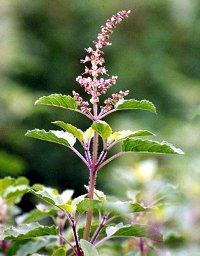 Tulasi, also called Tulsi, is a holy basil plant that has exceptionally rare qualities. Not only is Tulasi – “the incomparable one” in the Sanskrit language – worshiped in Hindu temples and homes, but the abundant attributes of its leaves, flowers, wood and roots range widely from spiritual purification to medicinal healing.
Tulasi, also called Tulsi, is a holy basil plant that has exceptionally rare qualities. Not only is Tulasi – “the incomparable one” in the Sanskrit language – worshiped in Hindu temples and homes, but the abundant attributes of its leaves, flowers, wood and roots range widely from spiritual purification to medicinal healing.
The Puranic literature of India tells us the stories about how Tulasi Devi took the form of a plant to purify the world, and therefore is used in religious rituals to clean and elevate the soul.
In a way that is both sustainable and renewable, this small holy tree is harvested with respect and devotion towards Tulasi Devi and crafted into our Tulasi Natural Jewelry Collection. With this, we offer the blessing of this spiritual tree with the sacred message of harmony with nature and love for the Divine. When someone wears Tulasi, one attracts divine energy as Sri Krishna likes to be with his beloved devotee, Tulasi Devi.
Physically, Tulasi is a sub-shrub that usually grows only 1-2 feet in height. Its green leaves, which are either of the white or dark variety, have a strong scent, and its small purple flowers make it even more appealing to the eye. The plant is highly appreciated by yogis, mystics and saints who consider it a privilege just to water it. In the Vedas, the oldest religious texts in the world with a written history of over 5,000 years and oral history that dates back to time immemorial, it is referenced as a sacred tree with purifying powers and other beneficial qualities. The plant is also stated as being the incarnation of the Goddess Lakshmi, with the devotional name Tulasi Devi. Many Hindus have a Tulasi plant in or near their homes and worship her as the Goddess Lakshmi, the consort of Sri Krishna. Keshava is another name for Krishna. Tulasi can also be found next to Hanuman temples.
 Tulasi wood and roots are light and soft, and are hand-carved into 108 mala beads that devotees meditatively pass between their middle finger and thumb while chanting sacred mantras. The wood is also crafted into decorative necklaces, such as our Tulasi Natural Jewelry Collection, which are not only auspicious to wear and physically appealing, but can also be purifying.
Tulasi wood and roots are light and soft, and are hand-carved into 108 mala beads that devotees meditatively pass between their middle finger and thumb while chanting sacred mantras. The wood is also crafted into decorative necklaces, such as our Tulasi Natural Jewelry Collection, which are not only auspicious to wear and physically appealing, but can also be purifying.
Tulasi petals are mixed with water and given to the dying in order to raise their souls to heaven as they depart. A single Tulasi twig can purify a pile of firewood, just as water from the sacred Ganges River purifies regular water, and the soul of one whose dead body is cremated with this holy wood can attain to the spiritual abode.
According to the Vaishnava branch of Hinduism, in which Sri Vishnu is the predominating deity, the sacred Purana texts describe the gods and demons churning the ocean, with both sides wanting to retrieve the nectar that had been hidden there. The gods succeeded, causing Dhanvantari, the divine avatar of Ayurvedic medicine, to shed tears of happiness. When his first tear dropped in the nectar, it formed Tulasi.
 For thousands of years, Tulasi has been used in Ayurvedic medicine for its diverse healing properties and ability to promote longevity as well as to balance different bodily processes and help one to adapt to stress. It is taken as herbal tea, dried powder, fresh leaf or used in the form of essential oil. When Tulasi leaves are being collected, devotional harvesters chant the following mantra:
For thousands of years, Tulasi has been used in Ayurvedic medicine for its diverse healing properties and ability to promote longevity as well as to balance different bodily processes and help one to adapt to stress. It is taken as herbal tea, dried powder, fresh leaf or used in the form of essential oil. When Tulasi leaves are being collected, devotional harvesters chant the following mantra:
tulasyamrita janmasi sada tvam keshavapriye
keshavartham lunami tvam varada bhava shobhane
“O Tulasi, you were born from nectar. You are always very dear to Lord Keshava. Now in order to worship Lord Keshava, I am collecting your leaves and manjaris. Please bestow your benediction on me.”
Buy our Tulasi Jewelry collection:
 |
 |
 |
 |
 |
 |








2 comments
marian lambros
May 09, 2016 at 10:47 AMNamaste! I would like to add to your info on tulsi. This is also a sacred plant among the Greeks, a tradition that carried over to modern times. It is literally the King of herbs, Vasiliko’. It came into Christian tradition as growing under the cross of Christ, discovered by Queen Helena around 300 AD. Even American Greeks often grow this plant, for its holy nature.
Prabhuji's Gifts
May 09, 2016 at 10:47 AMThis is really interesting information. thank you very much Marian! Isn’t it so fascinating that the same plant gets such a similar importance in different spiritual traditions?